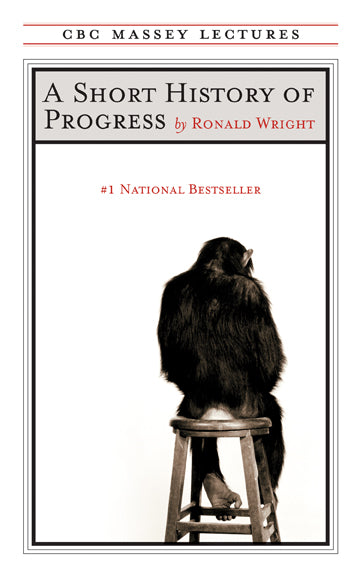Now more relevant than ever, Ronald Wright’s #1 national bestseller, A Short History of Progress. The fifteenth anniversary edition includes a new introduction warning of the accelerating patterns of progress and disaster.
Each time history repeats itself, so it’s said, the price goes up. The twentieth century was a time of runaway growth in human population, consumption, and technology, placing a colossal load on all natural systems, especially earth, air, and water — the very elements of life. The most urgent questions of the twenty-first century are: Where will this growth lead? Can it be consolidated or sustained? And what kind of world is our present bequeathing to our future?
In his #1 national bestseller A Short History of Progress Ronald Wright argues that our modern predicament is as old as civilization, a 10,000-year experiment we have participated in but seldom controlled. Only by understanding the patterns of triumph and disaster that humanity has repeated around the world since the Stone Age can we recognize the experiment’s inherent dangers, and, with luck and wisdom, shape its outcome. In his new introduction to the fifteenth anniversary edition, Wright looks at the past fifteen years of human innovation — and asks whether we can still get the future right.
Now more relevant than ever, Ronald Wright’s #1 national bestseller, A Short History of Progress. The fifteenth anniversary edition includes a new introduction warning of the accelerating patterns of progress and disaster.
Each time history repeats itself, so it’s said, the price goes up. The twentieth century was a time of runaway growth in human population, consumption, and technology, placing a colossal load on all natural systems, especially earth, air, and water — the very elements of life. The most urgent questions of the twenty-first century are: Where will this growth lead? Can it be consolidated or sustained? And what kind of world is our present bequeathing to our future?
In his #1 national bestseller A Short History of Progress Ronald Wright argues that our modern predicament is as old as civilization, a 10,000-year experiment we have participated in but seldom controlled. Only by understanding the patterns of triumph and disaster that humanity has repeated around the world since the Stone Age can we recognize the experiment’s inherent dangers, and, with luck and wisdom, shape its outcome. In his new introduction to the fifteenth anniversary edition, Wright looks at the past fifteen years of human innovation — and asks whether we can still get the future right.
| Published By | House of Anansi Press Inc — Oct 23, 2004 |
| Specifications | 232 pages | 5 in x 8 in |
| Keywords | civilization; social collapse; human migration; regeneration; natural resources; consumption; ancient civilizations; modernity; evolution; genome analysis; DNA; world history; ancestry; anthropocene; history; ecology; anthropology; political science; poli sci; notes; bibliography; index; bestselling book; national bestseller; The Return of History; Jennifer Welsh; Therefore Choose Life; George Wald; In Search of a Better World; Payam Akhavan; Sapiens; Yuval Noah Harari; Homo Deus; |
|
Supporting Resources
(select item to download) |
Excerpt |
| Written By | Ronald Wright is an award-winning novelist, historian, and essayist. He lives in British Columbia. Visit Ronald Wright's website: http://ronaldwright.com/ |
| Written By |
| Ronald Wright is an award-winning novelist, historian, and essayist. He lives in British Columbia. Visit Ronald Wright's website: http://ronaldwright.com/ |
“Wright sifts the findings of archaeology and anthropology with thoughtful grace to build a potent argument.” —Guardian
“Impressive . . . for the evidence Wright assembles from his authoritative grasp of history, and for the skill and clarity with which he imparts information. He makes history, ecology, anthropology, and political science easy to read.” —Associated Press
“Provocative . . . Already a bestseller in Canada, Wright is now making his biggest mark since his debut novel (A Scientific Romance, 1997) attracted wide attention… illuminating and disturbing, and expansively documented.” —Kirkus Reviews
“I don’t care if you have never read and will never read any kind of book at all, but you must read this one.” —Globe and Mail
“An elegant and learned discussion of what the rise and fall of past civilizations predict about our own: nothing good.” —Maclean's

